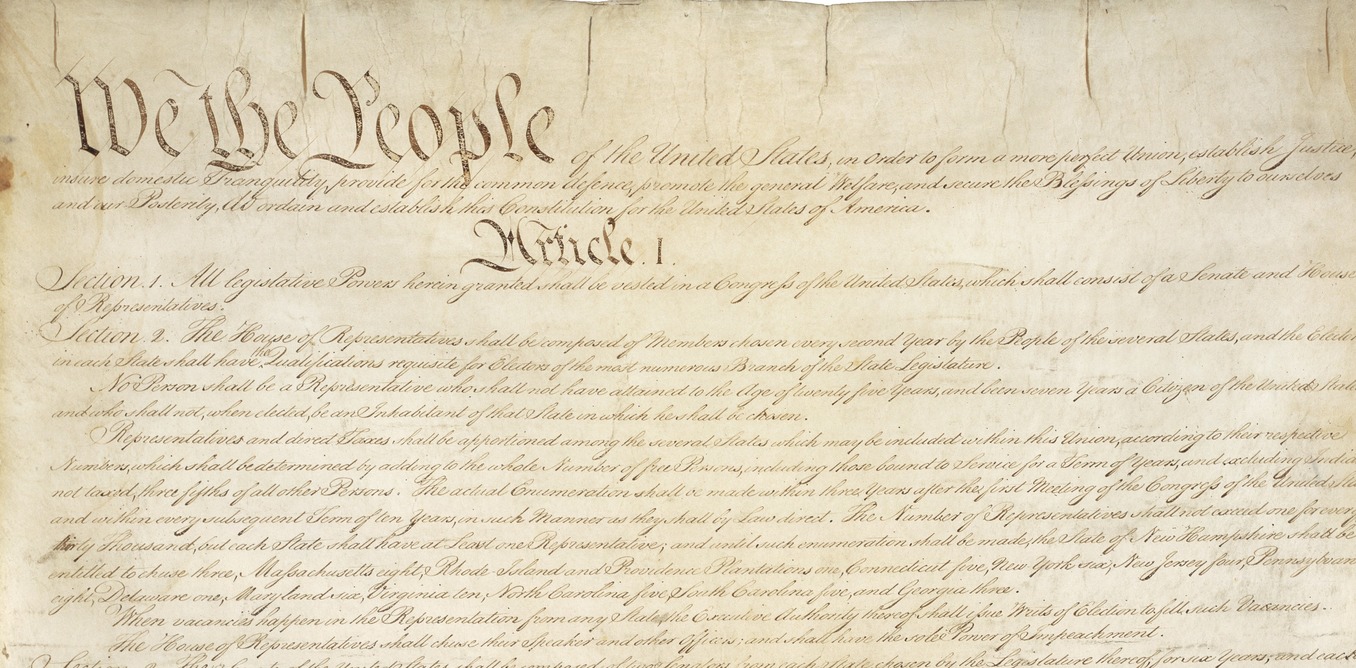FBI Director James Comey’s Oct. 28 bombshell letter to Congress – which has the potential to affect the presidential election – may be based on illegally obtained emails.
In his letter, Comey says the FBI “has learned” of the existence of emails “that may be pertinent” to the closed investigation of Hillary Clinton’s use of a personal email server during her tenure as secretary of state. He writes that although “the FBI cannot yet assess whether or not this material may be significant,” he has directed investigators “to review these emails to determine whether they contain classified information.” As the nation’s chief law enforcement officer, Attorney General Loretta Lynch has the apolitical and urgent responsibility to determine whether these emails were obtained in a manner consistent with the Constitution.
We don’t know everything yet, but we know a fair amount already about these emails and how the FBI got them. Comey tells Congress that the FBI “learned” of the emails’ existence “in connection with an unrelated case.” Multiple media sources are now reporting that they were found during the FBI’s investigation of allegations that former Congressman Anthony Weiner sent sexual text messages to a 15-year-old girl in North Carolina.

Under FBI investigation: Anthony Weiner. U.S. Congress
The FBI apparently seized a laptop from Weiner on which more than 1,000 emails belonging to his estranged wife, Huma Abedin, had been backed up. Abedin, who is currently vice chairman of the Clinton presidential campaign, had served as deputy chief of staff to Clinton when she was secretary of state.
If the laptop was “seized” by the FBI, it’s unlikely that either Weiner or Abedin voluntarily turned over the emails. That means the agency needed to get a search warrant, by swearing to a judge there was probable cause to believe that data on the laptop contained evidence of the suspected “sexting” crime. Under the Constitution, the warrant should have specified exactly the information to be seized and searched, and thereby limited the FBI from looking through the entire contents of the laptop.
As a constitutional scholar, I have studied the FBI’s troubling history of deliberately abusing search warrant powers to go on unconstitutional fishing expeditions through Americans’ email. It seems likely that happened again here.
Was the search properly limited?
The Fourth Amendment to the Constitution states that no search warrant can be issued unless it “particularly describes the place to be searched and the things to be seized.” Did the warrant for Weiner’s laptop “particularly describe” emails sent to or received by Abedin while working at the State Department as material that could be seized as evidence of the alleged sexting crime? That seems highly unlikely.

Not aware of her husband’s alleged sexting: Huma Abedin. U.S. Department of State
Indeed, why were federal agents looking at any emails belonging to the suspect’s estranged spouse? Surely the FBI didn’t think Abedin was involved in the alleged sexting crime.
The agents might make the implausible claim that they saw Abedin’s emails inadvertently when looking for evidence related to the sexting crime. But even then, the legal approach would have required seeking Abedin’s consent to review the emails. If she declined, the FBI could have sought a new search warrant for specific Abedin messages, swearing to a federal judge that there was probable cause those particular emails were evidence of a crime, presumably related to the State Department email investigation.
So far there are no reports that the FBI did either of these things. To the contrary, Comey’s own letter says the FBI has no idea if the emails are even “significant.” So how could the FBI get a search warrant to review them?
A regular pattern of FBI abuse

Dropping a bombshell: FBI Director James Comey. FBI
It may seem extreme to suspect that federal agents sworn to uphold the Constitution would deliberately violate it to go on an unauthorized fishing expedition through Weiner’s laptop. However, there is clear evidence that the FBI regularly and deliberately oversteps constitutional boundaries with regard to Americans’ email messages.
In one case now pending in New Jersey, the FBI went completely beyond the limits of a search warrant to download the entire contents of a lawyer’s cellphone. Incredibly, federal prosecutors in that case are telling a federal judge they can legally keep and use the downloaded data even if the judge rules it was obtained in violation of the Constitution.
In New York City, federal court records reveal the government obtained another search warrant that clearly violated the Fourth Amendment. That one ordered Microsoft to turn over the entire contents of a web-based email account and authorized “email by email review.”
It is time for Congress to act
There have been some preliminary efforts to rein in the FBI. Last spring, a bipartisan bill was introduced in Congress that would begin the process. It would create a National Commission on Security and Technology Challenges including experts from many sectors such as law enforcement, the technology industry, the intelligence community, and the privacy and civil liberties communities. The commission would review the laws about warrants for digital data and recommend changes in how they should be used.
That effort followed the FBI’s ill-advised attempt to get a court order forcing Apple to create and give to the government software eliminating the user privacy and security features of the iPhone.
In the wake of this week’s new evidence of further overstepping by the FBI, passing this bill should be one of the first tasks for Congress when it reconvenes after the election. Searches such as the likely illegal one conducted on Weiner’s laptop should be discovered, documented and prevented in the future.
How to handle the emails now

Time to act: Attorney General Loretta Lynch. U.S. Department of Justice
Attorney General Lynch should immediately press Comey for details about what steps he took to determine that these emails were obtained legally. Can the FBI show that a proper warrant authorized seizure of those particular emails? If the agency cannot do so, she should consider the recommendations of several federal judges for how to handle digital data.
Specifically, the messages should be immediately turned over to an independent court officer for any further review. Lynch could, for example, ask the chief judge of the federal district handling the Weiner investigation to appoint a court-supervised special master to take charge of the emails. Using procedures fair to both law enforcement and the owner of the email, that person could determine if they reveal evidence of a crime. And Lynch should explain to the American people exactly what the FBI agents did legally, and admit if they acted outside the law.
Stepping up to preserve Americans’ rights
The Fourth Amendment was written in response to the abusive use of search warrants by the government of King George III. Specifically, Americans objected to searches of the homes of political dissidents, which examined all a person’s private papers in hopes of finding evidence to imprison him.
In one case successfully challenging this practice, the lawyer for the victim of such a search spoke words that ring true today:
“Ransacking a man’s secret drawers and boxes to come at evidence against him is like racking his body to come at his secret thoughts. Has [the government] a right to see all a man’s private letters of correspondence, family concerns, trade and business? This would be monstrous indeed; and if it were lawful, no man could endure to live in this country.”
 Clark D. Cunningham does not work for, consult, own shares in or receive funding from any company or organization that would benefit from this article, and has disclosed no relevant affiliations beyond the academic appointment above.
Clark D. Cunningham does not work for, consult, own shares in or receive funding from any company or organization that would benefit from this article, and has disclosed no relevant affiliations beyond the academic appointment above.
This article was originally published on The Conversation. Read the original article.



 Zelenskiy Awaits U.S. Details as Ukraine Prepares for Possible Peace Talks Next Week
Zelenskiy Awaits U.S. Details as Ukraine Prepares for Possible Peace Talks Next Week  Google Seeks Delay on Data-Sharing Order as It Appeals Landmark Antitrust Ruling
Google Seeks Delay on Data-Sharing Order as It Appeals Landmark Antitrust Ruling  Trump Lawsuit Against JPMorgan Signals Rising Tensions Between Wall Street and the White House
Trump Lawsuit Against JPMorgan Signals Rising Tensions Between Wall Street and the White House  Minnesota Judge Rejects Bid to Halt Trump Immigration Enforcement in Minneapolis
Minnesota Judge Rejects Bid to Halt Trump Immigration Enforcement in Minneapolis  Federal Reserve Faces Subpoena Delay Amid Investigation Into Chair Jerome Powell
Federal Reserve Faces Subpoena Delay Amid Investigation Into Chair Jerome Powell  Kevin Warsh’s Fed Nomination Raises Questions Over Corporate Ties and U.S.–South Korea Trade Tensions
Kevin Warsh’s Fed Nomination Raises Questions Over Corporate Ties and U.S.–South Korea Trade Tensions  BTC Dips on Trade Tension Ease, But 450 BTC/Day Whale Says “Buy More” – Eyes $107K Glory
BTC Dips on Trade Tension Ease, But 450 BTC/Day Whale Says “Buy More” – Eyes $107K Glory  OCBC Raises Gold Price Forecast to $5,600 as Structural Demand and Uncertainty Persist
OCBC Raises Gold Price Forecast to $5,600 as Structural Demand and Uncertainty Persist  Morgan Stanley Flags High Volatility Ahead for Tesla Stock on Robotaxi and AI Updates
Morgan Stanley Flags High Volatility Ahead for Tesla Stock on Robotaxi and AI Updates  Panama Supreme Court Voids CK Hutchison Port Concessions, Raising Geopolitical and Trade Concerns
Panama Supreme Court Voids CK Hutchison Port Concessions, Raising Geopolitical and Trade Concerns  U.S.–Venezuela Relations Show Signs of Thaw as Top Envoy Visits Caracas
U.S.–Venezuela Relations Show Signs of Thaw as Top Envoy Visits Caracas  Christian Menefee Wins Texas Special Election, Narrowing GOP House Majority
Christian Menefee Wins Texas Special Election, Narrowing GOP House Majority  DOJ Urges Judge to Block Lawmakers’ Bid for Special Master in Jeffrey Epstein Records Case
DOJ Urges Judge to Block Lawmakers’ Bid for Special Master in Jeffrey Epstein Records Case  Trump Says Fed Pick Kevin Warsh Could Win Democratic Support in Senate Confirmation
Trump Says Fed Pick Kevin Warsh Could Win Democratic Support in Senate Confirmation 

































